#dr. müller
Explore tagged Tumblr posts
Text






Marlenes and other funny guys
(reference for picture 2 under the cut)

44 notes
·
View notes
Text

The Adventures of Tintin - "The Black Island" (1943)
Page 36, Frame 01
39 notes
·
View notes
Text



My dads
#robert sean leonard#christian bale#thomas berger#peter müller#swing kids#batman#the dark knight#house md#bruce wayne#james wilson#dr james wilson
25 notes
·
View notes
Text
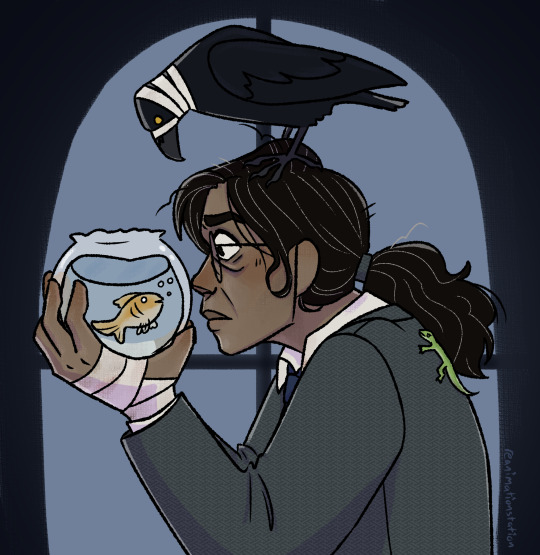
after getting out of a state of some confusion Tomas decided that the best course of action would be to adopt some pets. the "load bearing" goldfish, for nightmares, and the lizard because it felt familiar. then they just kinda?? got handed the raven. which naturally they accepted, because they saw a lot of themselves in the bird, not that they're ever admitting that to anyone ever. though now they are dealing with the consequences of owning a lizard that seems to hate them
#that lizard is out to get me istg#victors art#fallen london#fallen london oc#dr tomas müller#i love creating guys who look like my other guys#what's so funny is tomas doesn't look like ernest. AT ALL.#victors ocs
85 notes
·
View notes
Text

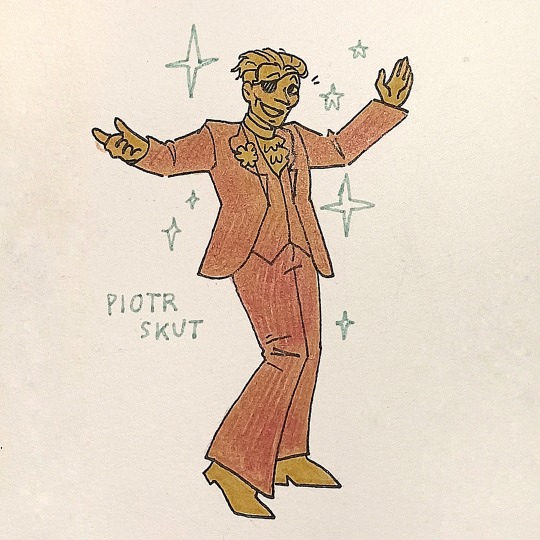
Tintin Character Requests Pt. 2
The series where I draw Tintin characters in funky little outfits cuz they truly are funky little characters
I'm finishing up the last of requests that I've received, and first up, RASTAPOPOULOS aaaand DR MULLER!! ik in a fight between the two, Muller would probably be the one to win, but then I remember flight 714 and then I looked at the pose reference, and I realized rastapopoulos is much much more girly pop, and in his word, is "badder", and hence, this drawing.
I HAD SO MUCH FUN DRAWING THIS AND I HOPE YOU GUYS LIKE IT!!!!!!!
Ty @akasanata and @naradreamscape for the requests!!!! :DD
And last one, we've got Skut!!!! I REALLY REALLY LIKE HIM!!!!! he's got one of my favorite character designs in the series, I like his vibes, and I just really really like him!!!! I've already said that. But unfortunately I can't really say much about him other than that, not cause I like him, but I actually have only seen him in flight 714!!! I haven't watched the red sea sharks, BUT I PROMISE I WILL. HE LOOKS REALLY COOL. AND I LIKE HIS VOICE
Tysm to @daftydill for the request!!!! <333
Anyway, that's about it for today!!! Feel free to send more tintin characters I could maybe draw!!!! I think it's good drawing practice!!!!
Have a good evening everyone <33 take care
#the adventures of tintin#tintin#adventures of tintin#piotr skut#rastapopoulos#dr müller#dr muller#tea art 🎨#oklo makes a post
68 notes
·
View notes
Text
"Covid-19 und die Pandemie als Amoklauf des Finanzkapitals" - Empfehlung der Broschüre von Fabio Vighi
Beim Lesen vorliegender Broschüre kamen mir Gedanken wieder in den Sinn, welche mich schon in einem meiner Blogs im Jahr 2021 beschäftigt hatten. Kam das Corona-Virus gerade recht? Gemeinhin steckt hinter dem „Neustart“, auch „Umbruch“ genannt, ein im Grunde schon Jahrzehnte im Gange befindlicher Rollback (Neoliberalismus, resp. Marktradikalismus etc.), um das alte, dem Kollaps zulaufende…
#Albrecht Müller#Covid-19#Ernst Wolff#Fabio Vighi#freitag.de#ICI#Klaus Schwab#pad-Verlag#Prof. Dr. Rudolph Bauer#Stéphane Hessel
0 notes
Text
Atemwegsinfekte bye-bye! Dank Inhalationen, Wickel und Senfölen bekomme ich endlich gut Luft
Bei #Atemwegsinfekten machen #Antibiotika eigentlich keinen Sinn. Trotzdem bekommt laut Uni Rostock jeder fünfte bis sechste Atemwegs-Patient das Medikament verordnet. Wie es anders geht, dazu meine neue #Patientenreportage aus der #klinikhattingen
Hartnäckig. Aus Angst vor einem Infekt hätte Susanne Weber ihre Wohnung Anfang 2023 am besten gar nicht mehr verlassen. „Ein hüstelnder Kollege in unserem Großraumbüro, ein keimbelasteter Einkaufswagen, eine viertel Stunde im Windzug am Bahnhof – in den letzten 18 Monaten konnte ich gar nicht so schnell gesund werden, wie ich mir den nächsten Infekt einfing“, blickt die Grafikerin aus Essen…
#André Berger#antientzündlich#Brustwickel#Dr. Birke Müller#Erfahrung mit Angocin#featured#Gesundheit#Hattingen#Husten#Infektabwehr#Kapuzinerkresse Meerrettich#Klinik Blankenstein#Medizinjournalist#Naturheilkunde#Naturkunde-Abteilung#NRW#Patientenfall#Patientenreportage#Patientenschicksal#Senföle#Senfölkombination#Soleinhalationen#Thymian#Was hilft bei Atemwegsinfekten
0 notes
Text

AfD wirbt mit Fake-Frau Diese Frau gibt es gar nicht! Die AfD erfindet Doktortitel, spuckt die Schülerin aus und trägt für nichts die Schuld.
'Ich werde AfD Mitglied. Der Hass, die undifferenzierte Zuschreibung von unbewiesenen Vorgängen lassen mich erschaudern. Andersdenkende werden ausgegrenzt. Das sind Anzeichen von Faschismus.
Dr. Stefanie Müller, Göppingen '
youtube
#afd#fpö#frau#fake-frau#Fakefrau#Dr. Stefanie Müller#Dr. Stefanie#Dr#Stefanie#Müller#Stefanie Müller#Müller Stefanie#schülerin#loretta#schizo#schizos woche#AfD ist unschuldig#ist#unschuldig#AfDnee#FPÖnee#afdjaa?#FPÖja?#FPÖjaa?#scheißNazis#nieWieder#nieWiederIstJetzt#noAfD#noNazis#wirsindBunt
0 notes
Text
Dr. Christiane Müller wird 65
Am 25. August feiert Dr. Christiane Müller, Tierschutzbeauftragte der FN und Mitglied des FN-Präsidiums, ihren 65. Geburtstag. Dr. Christiane Müller entdeckte schon früh ihre Liebe zum Pferd und erwarb bereits mit 18 Jahren das Silberne Reitabzeichen. Nach ihrem Studium der Agrarwissenschaften an der Georg-August-Universität Göttingen war die gebürtige Sauerländerin zunächst an der…

View On WordPress
0 notes
Text
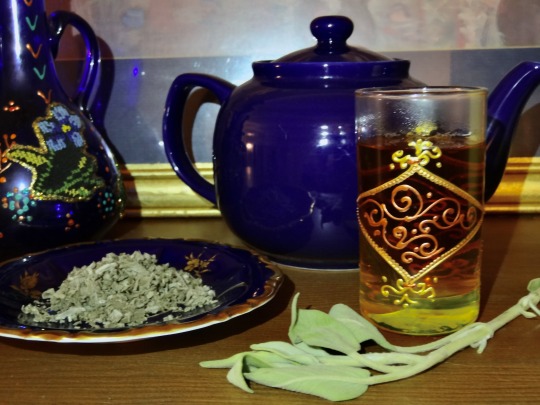
[ID: A Moroccan teaglass with a bundle of sage, a saucer of dried sage, a deep blue-purple teapot, and a Palestinian vase in the background. End ID]
شاي المريمية / Shay al-maryamiyya (Palestinian sage tea)
Palestinian sage is a common after-dinner beverage and digestive aid made from black tea and three-lobed wild sage (Salvia fruticosa syn. Salvia triloba L.). In the Levant, this variety of sage is known as "مَرْيَمِيَّة" ("maryamīyya") or, more dialectically, "مَرْمَرِيَّة" ("marmariyya").
Terminology and etymology
The term "maryamīyya" likely derives from the Aramaic "מרייא" ("marvā"), meaning "common sage" (Salvia officinalis). The modern form of the word in Arabic—as well as in Persian, in which "مریم گلی" ("maryam goli") is “sage” or "garden sage"—was also influenced by a folkloric association between sage and the مَرْيَم (Maryam) of the Bible (Mary, mother of Jesus). Dr. Tawfiq Kanaan, for example, says that Mary sat on a stone to rest after a walk in the hot summer sun, and used a few leaves from a sage plant to dry her forehead: this is how the plant got its pleasant scent, and why it is still named after Mary. The dialectical pronunciation "marmariyya" then arises through an assimilation of the second syllable to the first.
"Maryamīyya" is perhaps also related to the obsolete Arabic مَرْو ("marw"), meaning "fragrant herbs" [1]. This Arabic term is derived from the Aramaic מַרְוָא / ܡܲܪܘܵܐ ("marwā"), which refers to wild marjoram or za'tar (Origanum syriacum; syn. Origanum maru) and is related to words for fragrant herbage, marjoram, and grass (Ciancaglini; see also Aramäische Pflanzennamen, p. 193). The Aramaic is itself a borrowing from the southwest Middle Persian "𐭬𐭫𐭥𐭠" (transliterated: mlw'; pronounced /marw/) [2], which survives in several New Persian words: see for example "مرغ" ("margh"), "a species of grass of which animals are exceedingly fond"; and "مرو" ("marv"), "a fragrant herb." (Interestingly, the related Sanskrit मरुव "maruva" ultimately gives the English "marjoram" by way of Latin and Old French.)
[1] The term may also refer to the genus Maerua (to which it gives its name), and in particular the species Maerua crassifolia.
[2] See also Müller-Kessler, p. 10, and note 41 on p. 29; MacKenzie, p. 55.
Sage and Palestinian Culture
Three-lobed sage is one of the "most deeply rooted plants in the Palestinian traditional culture and ethnobotany," being the second-most-mentioned of all foraged plants (after za'tar) in a survey conducted in 2008. The connection of three-lobed sage to Maryam leads to its use in creating protective blessings at various rituals from birth until death; in the Galilee, it is burned to guard against the evil eye and to expel demons at births, weddings, and at the graves of holy people. When consumed, it is believed to help with many ailments including stomach complaints, eye diseases, and insomnia, and is used to treat livestock as well as humans.
Maryamiyya is not commonly grown as a garden herb in Palestine; rather, it is foraged from its wild range across the mountains of the West Bank, where it scents the air. Like za'atar and labna, using maryamiyya for culinary purposes is connected to Palestinian identity throughout all regions, with some people asserting that every Palestinian household must have some in stock.
Tea made with the addition of sage is perhaps the most popular herbal tea in Palestine, especially in the winter: though mint, chamomile, and aniseed are also commonly infused in water and drunk. Other varieties of sage grow in Palestine and are produced and exported by Palestinian farmers [1], but Gustaf Dalman noted in the early 20th century that three-lobed sage was the most important variety:
Of the spicy-smelling labiate flowers, which assume a significant role in the flora of Palestine, numerous sage varieties bloom in the spring. Among these the Salvia triloba, with violet flower heads on a tall shrub, is not the most colorful but is the best known, called in the north 'ēzaqān [عِيزَقَانْ] and in the south miryamīye, mēramīye thus connecting it with the Virgin Mary. (trans. Nadia Abdulhadi Sukhtian)
During the spring, sage leaves are collected and air-dried for use in tea throughout the whole year. Tea may also be made from fresh leaves, but some people consider dried to be superior. Dried maryamiyya leaves are purchased by Palestinian refugees and expatriates wherever they are. Food is thus tied to locality, memory, resistance, and terroir—a groundedness in land that considers aspects as diverse and interconnected as soil, climate, and politics. A concept of terroir in agriculture and cooking brings out how products "register[] origin and provenance."
[1] Today, the vast majority of Palestinian herb exports are to the United States, but Palestinian farmers are not able to export goods themselves—they rely on Israeli distributors and exporters, which cuts into their profits and curtails their autonomy.
Criminalizing Foraging
Ali-Shtayeh et al. noted in 2008 that the gathering of wild edible plants had been in decline in the Palestinian territories throughout preceding decades, with many young people lacking the cultural knowledge to identify and prepare wild plants. They mention several possible reasons for the decline, including an increase in intensive agriculture, improvement in national networks of roads, and the fact that some middle-aged people associate foraging with times of poverty. But we should also consider the fines, arrests, and potential imprisonment that Palestinians risk when foraging wild plants for food as a likely cause for the decline in the practice.
There are two strains of law relevant to the criminalization of foraging in "Israel" and the occupied Palestinian territories (the West Bank and Gaza: henceforth "OPT"). The first consists of primary laws which establish the right of representatives of the Israeli government to declare a plant to be a protected "natural value" (ערכי טבע), and lay out the maximum penalties people can be charged with for causing "harm" ("פג'עה") to a protected plant; the second comprises secondary declarations in the form of lists of which plants are considered protected.
The 1963 Natural Parks and Nature Reserve Law (חוק גנים לאומיים ושמורות טבע, תשכ"ג - 1963) belongs to the first strain. It empowered the Minister of Agriculture to declare a plant to be protected within "Israel," subject to the approval of a government council (ch. 5, 40-42); and declared that harming a plant was an offence punishable by up to three months' imprisonment (chapter 6).
In the text of the law, "harm" is specifically defined to include "picking," "קטיפה," and "gathering," "נטילה." No systematic distinction is established based on how much of the plant was harvested, and whether the plant was foraged for personal or commercial purposes. Nor is there any qualification of what qualities a plant should have to be considered "protected," or any obligation for the government to pursue or present scientific evidence that a given plant is overharvested.
In 1969, The Decree on the Protection of Nature (צו בדבר הגנה על הטבע) (Military Order no. 363) gave similar authority to the occupying military, and criminalized foraging in the OPT. Military orders are enforced by military courts, whereas offenders in "Israel" go through civil courts.
Several plants were already on the list of protected natural values at this time, but they were not commonly foraged for food. 1977 proved a signal year in this regard: with the "Proclamation of National Parks and Nature Reserves" [אכרזת גנים לאומיים ושמורות טבע (ערבי טבע י מוגנים), תשל״ח -1977], Minister of Agriculture Ariel Sharon (אריאל שרון) added za’tar ("אזוב מצוי") and maryamiyya ("מרוה משולשת") to the list. The inclusion of these plants, and especially za'tar, was more disastrous and insulting than previous bans on foraging had been. Za'tar, besides being a source of food and income for many poor or disabled Palestinians, has immense cultural significance in Palestine.
Arab Palestinians—and only Arabs—were arrested, fined, and even imprisoned, with no clear correspondence between the amount they had foraged and their sentencing. Most of the recorded court cases in "Israel" deal with za'tar, though court cases in legal databases show that Palestinians were also fined and tried for foraging maryamiyya (FN 38). An atmosphere of intimidation prevailed, with many habitual foragers feeling newly afraid to leave their homes.
In 1998, a new National Parks, Natural Reserves, National Sites and Memorial Sites Law [חוק גנים לאומיים, שמורות טבע, אתרים לאומיים ואתרי הנצחה, תשנ"ח-1998] replaced the prior National Parks law (of 1992, which had itself replaced the aforementioned 1963 law). It removed the necessity for an ecological council to approve the Minister's declaration of a "protected" status, and increaed the maximum prison time for a violation of the law to three years. Throughout all periods, however, the penalty usually imposed has been a fine.
Since the imposition of the harsher law, two notable updates have been made to the list of protected plants: the 2005 list of Protected Natural Assets) [אכרזת גנים לאומיים, שמורות טבע, אתרים לאומיים ואתרי הנצחה (ערכי טבע מוגנים), התשס״ה–2005] replaced the 1979 list, and added عَكُوب ('akoub; "עכובית הגלגל"), a culturally important and commonly foraged thistle. [1] Za'tar and maryamiyya remained on the list. The 2005 declaration also specifies that the species on the list are protected if they are wild, but not if they are cultivated (section 3). This provision allows Israeli farmers to profit from the farming and sale of za'tar.
The second notable update came in 2019: the Nature and Parks Authority (שרשות הטבע והגנים) announced that it would redact the absolute ban on harvesting za'tar, maramiyya, and 'akoub, instead setting a maximum allowable amount for household consumption and cracking down on the sale of these plants, rather than on foraging itself.
Activists believe this partial measure to have occurred as a result of legal and public pressure instigated by an open letter which human rights lawyer Rabea Eghbariah sent the Israeli Attorney General and Environmental Protection Minister requesting that za'tar, 'akkoub, and maryamiyya be removed from the "protected" list in advance of their foraging seasons, noting the inconsistency in sentencing and the law's disproportionate criminalization of Palestinians. (The specific cultural importance of these three plants is attested by the fact that they, among the dozens of species considered "protected," form the basis of Eghbariah's complaint.) The Nature and Parks Authority (NPA), however, insisted that an independent assessment, and not public criticism, had led them to announce the change in policy. And fines levied at Palestinian foragers did continue despite the announced change in policy, at least through March 2020.
Nor is the change complete in scope, even if it were being upheld. Eghbariah notes that "It is not yet clear if the change will also apply [in the West Bank] - and there it is a parallel system, less transparent and much more predatory. The enforcement is much worse, including the confiscation of cars, and the judgment is in a military court. We will continue to monitor."
[1] Eghbariah writes that the "Protected Natural Values Declaration (Amendment No. 2) (Judea and Samaria), 1978" added za'tar and maramiyya to the list in the OPT, and the "Protected Natural Values Declaration (Amendment No. 2) (Judea and Samaria), 2004" added 'akoub. I have been unable to find or independently verify the text of either declaration. From a list of secondary legislation related to military orders, I believe the declaration being amended is "הכרזה בדבר ערכי טבע מוגנים (יהודה והשומרון), התשל"ג - 1973".
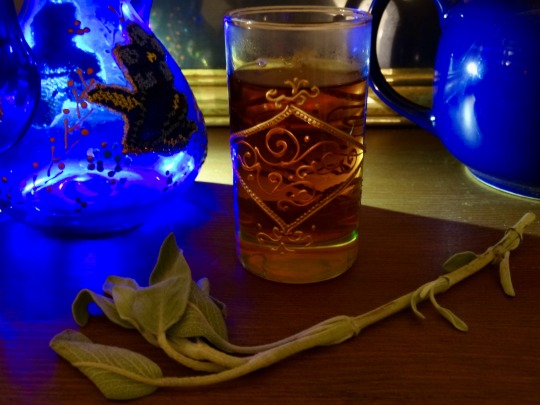
[ID: Light shone through a blue glass vase is cast over the bundle of sage and glass of tea. End ID]
"Preservation" and Green Colonialism
Of course, Palestinians and activists also suspect that the underlying purpose of the ban is to starve and intimidate Palestinians, rather than any real concern with nature. Israeli botanist Nativ Dudai points out that foraging causes much less harm to these plants than Israeli bulldozers do. Samir Naamneh, who sells foraged produce, also dismisses the environmentalist excuse for the ban on foraging:
We feel, and we know, and we’re sure, that the laws are made, on principle, against the Arab residents of the country, to hurt their livelihoods. It’s part of the pressure that Israel puts on us to starve us out.
The 1977 decision to add za'tar and maryamiyya to the protected plants list was ostensibly taken in accordance with a report submitted by a group of Israeli ecologists, which suggested that the species were in danger due to over-foraging. However, Israeli forager Yatir Sade (יתיר שדה) suggests that the converse may be true, and that the people who wrote the report might have taken their cues from the government.
On June 20, 1977, the inauguration of the Begin (בגין) Cabinet marked the first time that a right-wing party had held a majority in the Knesset; this dramatic change in Israeli politics would come to be called "המהפך" ("HaMahapakh"), "the revolution" or "the upheaval."
Sade's research reveals that, about a week later, on June 27, 1977, a team of ecologists at the NPA submitted a list of species to the Legal Bureau at the Ministry of Agriculture (משרד החקלאות), suggesting that they be declared protected. The list is accompanied by a letter of legal advice signed by a partner in the law firm Reva, Shein, Katz & Co. This initial suggested list did not include four species which would end up on the final 1977 list, all of them important culinary and medicinal herbs among Palestinians and Bedouin Arabs: babonj (בבונג / بابونج / golden chamomile), maryamiyya, za'tar, and ss'atr barriyy (صعتر بري / קורנית מקורקפת / Persian hyssop). [1]
But about four months later, on October 16, another letter was sent on behalf of the same law firm, requesting that these four species be added to the "protected" list, and that the standard procedure for adding them be expedited. Accordingly, on November 2, only a few days after receiving the letter, the Minister's office published the final declaration, with golden chamomile, maryamiyya, za'tar, and Persian hyssop newly added. The new Minister of Agriculture Ariel Sharon (אריאל שרון), part of the First Begin Cabinet and co-founder, with Menachem Begin, of the right-wing party HaLikud (הליכוד), signed the new declaration. It therefore seems likely that these plants were added to the list for political reasons and precisely because of their importance to Palestinian Arabs, rather than from any ecological concern.
It is also relevant that the 1963 and 1998 laws which criminalized foraging also laid out guidelines for the creation of national parks, nature reserves, and military and state memorial land. The text of the 1998 law, in particular, describes the goals behind creating these sites, and gives the council it establishes the authority to do anything necessary to promote those goals. These goals include to "protect natural and heritage sites" ("הגן על ערכי הטבע והמורשת"); to "maintain international scientific relations" in the field of nature conservation ("קיים קשרים מדעיים בין-לאומיים") ; to promote education about conservation among youth and students (7. (א)); and to promote travel and tourism (14. (א)).
Many discourses and strategies can here be seen operating together. The creation of nature reserves, state heritage sites, and military memorial land all within the text of the same law explicitly connects environmentalism to patriotism; creates special reasons for bringing land under state control, and imposing special codes of behavior on this land (i.e., natural and heritage sites); connects environmentalism to state ownership and control of land, and connects both to the education of youth and the creation of the ideal Israeli civic subject; uses environmentalism to promote Israel internationally as a scientific authority, a responsible steward of land (unlike the indigenous population), and thus a legitimate state; and sanitizes and 'advertizes' Israel internationally by associating sites of destruction, annexation, and ethnic cleansing with the concepts of environmental protection, natural beauty, preservation, and heritage.
Israel frequently declares land a "nature reserve" as a method of annexation, only to later build settlements on it (see Karimi-Schmidt p. 369 ff). Palestinians are forbidden from foraging certain plants within nature reserves (other plants are forbidden for foraging everywhere), and from constructing on them; they are thus alienated from this land, and dissociated from the ways in which they have long related to it. Yatir Sade points out that the four plants added to the original 1977 draft of the protected species list are typically harvested out in open areas, rather than within yards and villages; declaring these areas nature reserves, or arresting Arabs who enter them under suspicion of foraging, prevents Palestinians from moving freely, and from claiming any connection to the land. [3]
The "Green Patrol" (HaSayeret HaYeruka / הסיירת הירוקה), the enforcement unit for the NPA, was founded in 1976 by then-Minister of Agriculture Aharon Ozan and director of the Israel Land Administration Meir Zore, for the specific purpose of policing "open areas" (שטחים פתוחים) which had been declared state land, and preventing Palestinians from "tresspassing" ("הסגות גבול") or illegally building in these areas. [4] Through these strategies, land is appropriated for the state's and settlers' purposes under the guise of environmentalism.
In much the same way, the list of protected species is ultimately about using environmental science to cement state authority. Irus Braverman points out that endangered species lists function as a means of regulation, not least by being ostensibly objective: "their global power, mobility, and ubiquity derive from their configuration as scientific, technical, and quantitative, and therefore as neutral and apolitical." The protected species list thus joins other "environmental infrastructures," such as renewable energy and agricultural technologies, as a "mechanism[] for land appropriation and dispossession" of the indigenous population: together, these infrastructures make up a strategy that is alternately called greenwashing, green grabbing, and green colonialism.
[1] Letter regarding the declaration of national parks and nature reserves (protected natural values), 1977, from Ofir Katz to Tovi R. [מכתב בנושא אכרזת גנים לאומיים ושמורות טבע (ערכי טבע מוגנים) תשל"ז-1977, מאופיר כץ לטובי ר'], 6/27/1977. In: Proclamation of National Parks and Nature Reserves (Protected Natural Values), Ministry of Agriculture and Rural Development [אכרזת גנים לאומיים ושמורות טבע (ערכי טבע מוגנים), משרד החקלאות ופיתוח הכפר], January 1965–October 1982. State Archives, ISA-moag-moag-00119qy, pp. 164-175.
[2] Letter regarding a proposal to declare national parks and nature reserves (protected natural values), 1977, from Ofir Katz to Tovi R., [מכתב בנושא הצעה לאכרזת גנים לאומיים ושמורות טבע (ערכי טבע מוגנים) תשל"ז-1977] 10/24/1977. In: Proclamation of National Parks and Nature Reserves (Protected Natural Values), Ministry of Agriculture and Rural Development, January 1965–October 1982. State Archives, ISA-moag-moag-00119qy, p. 160.
[3] Yatir Sade, Master's thesis, pp. 68-9. Personal communication.
[4] Sade points out that Yehuda Reva (יהודה רווה), another partner of the law firm that provided legal advice on the matter of the 1977 protected species list, was also prominent in helping the Green Patrol expropriate Palestinian land and property within the bounds of Israeli law (Master's thesis, p. 44, FN 34).
Foraging and Food Sovereignty
The disastrous effect of these strategies and regulations should not be understated—but nor should their power to control Palestinians' behavior be overstated. Palestinians reference specific plants in writing and in art (including ceramics and tatreez), bring dried herbs to family members abroad, purchase or grow important culinary plants wherever they live in the diaspora, and continue to forage plants despite harassment and the risk of fines and arrest. Plants are an important way of symbolizing, and of practicing, resistance, resilience, and rootedness in history and in the land.
Foraging can be a strategy of reconnection in defiance of dispossession. Rochelle Davis notes that Palestinians often visit the villages from which they were displaced in order to gather grape leaves and herbs, “ingesting the place by consuming the land’s produce” (p. 172). Through this practice, as Anne Meneley puts it, "[e]ating becomes an act of momentary repossession."
The message boards on PalestineRemembered.com attest to this practice. When Mouttaz Ammoura returned to الطيرة (Al-Tira), the village from which his family was displaced, he noted maramiyya as the one plant he brought back with him:
Now I live in Canada, but far-away from AL-TIRA. When I came back, I brought with me some sand, maramieh, few stones, & water from Tirat Haifa. Yes, I brought all of that to remember al-Tira & to have it close to my hart back in Canada.
In an interview conducted in a Palestinian refugee camp in 1998, women demonstrate this same association of plant life with place:
They spoke of the names of land plots around ~ Tjzim (Wadi al-Nahel, Durat al-Qamar, Shana), and the act of naming evoked an aura of magic for those who remembered the places [...]. They also related to the wild plants. The women, who felt we had shifted to familiar ground, called out the names — khubeize (mallow), ‘aqub (tumble thistle), maramiyyeh (sage), za’atar (thyme).
Mirna Bamieh's Palestine Hosting Society put on an Edible Wild Plants Table, which registered the connection of foraging to place, local knowledge, and temporality. The project, which focused on "identifying the names, forms, locations and availability of wild plants in Palestine’s nature," involved a menu created from foraging in the mountainous regions of Palestine during the blooming season "from mid-January until the end of February."
Foraging is also one strategy among many that Palestinians use—alongside instituting agricultural innovations, creating native seed banks, educating about Palestinian cuisine, and seeking out contracts with foreign markets—to attain food self-sufficiency and sovereignty. It is therefore both a symbolically defiant strategy, and a practical one. Palestinians illustrate a belief in the illegitimacy of Israel's laws and claims, and insist on the primacy of their relationship to the land, when they forage for food.
When asked whether he believed that 2020 would bring the promised relaxation in criminalization of foragers, Samir Naamneh, who has been repeatedly fined, arrested, and tried over the past decades, told Dror Foyer (דרור פויר):
"We'll live and see, but it won't change anything for me: whether it's allowed or not, I'm going to forage. I do the work I love, and I'm at peace with myself. The fact that I'm making a statement to the State of Israel and their law—that's enough for me."
Donate to an evacuation fund
Donate eSims
Palestinian heirloom seeds
Ingredients:
250g filtered water
2.5g (1 1/2 tsp) high-quality loose leaf black tea
4g (1 1/2 Tbsp) dried three-lobed sage, or substitute another variety of sage
Sugar, to taste (optional)
Dried three-lobed sage can be purchased from a Palestinian brand such as Al-'Ard or Yaffa (not "Jaffa").
Instructions:
1. Combine tea with just-boiled water and steep for two minutes.
2. Add sage and steep for another minute.
3. Pour into tea glasses and serve hot.
Times and quantities are geared towards producing a tea that is mild enough to be enjoyed without sugar. Adjust as per preference.
371 notes
·
View notes
Text
WOO YEAH!!! you did amazing on all of them! thank you so much for drawing my guy Dr. Müller, you nailed his vibes so well!
RIGHT ART FIGHT DUMP







In Order:
@luckydragonblog @scarredkitty @strawberryitzi @sinnabee kyunkarma @reanimationstation @shirecorn
22 notes
·
View notes
Text
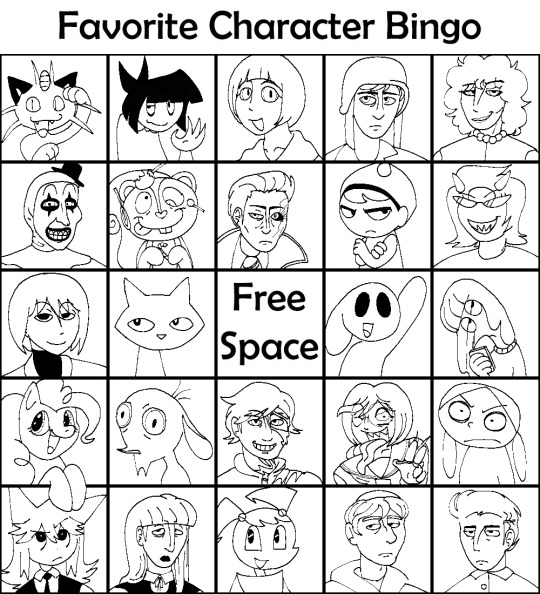
took me about a month to figure out everyone i wanted to put on here but its finally done..... each character under the cut
(left to right)
first row: team rocket's meowth (pokémon), creepy susie (the oblongs), mako mankanshoku (kill la kill), eugene sledge (the pacific), dr frank-n-furter (rocky horror picture show)
second row: art the clown (terrifier), nutty (happy tree friends), silco (arcane), mandy (the grim adventures of billy and mandy), terezi pyrope (homestuck)
third row: ougi oshino (monogatari), pete the cat (pete the cat), jean-françois (bunny maloney), ennui (inside out)
fourth row: pinkie pie (my little pony), ren (the ren & stimpy show), jack goodman (an american werewolf in london), genocider syo (danganronpa), vendetta (making fiends)
fifth row: moge-ko (mogeko castle), samarie (fear and hunger), jenny wakeman (my life as a teenage robot), brother guy (pentiment), müller (all quiet on the western front)
just gonna tag the medias cause thats already a lot of tags
#pokemon#the oblongs#kill la kill#the pacific#rocky horror picture show#terrifier#happy tree friends#arcane#the grim adventures of billy and mandy#homestuck#monogatari#pete the cat#bunny maloney#inside out#my little pony#ren & stimpy#an american werewolf in london#danganronpa#making fiends#mogeko castle#fear and hunger#my life as a teenage robot#pentiment#all quiet on the western front
56 notes
·
View notes
Text

The Adventures of Tintin - "The Black Island" (1943)
Page 28, Frame 07
32 notes
·
View notes
Text

i FINALLY got time to make some digital art for Tomas, but instead of being normal i decided that YEAH. THIS IS A GREAT TIME TO EXPERIMENT WITH ART STYLES. and thus this became a bigger undertaking than i mean it to be. of course i'm being a bit dramatic, and i really am pleased with how they turned out. a proper colored ref for them will simply have to wait.
(mild???? carnival spoilers????? its accessible pretty early game but better safe than sorry) but right, this is right before their first death, which in retrospect was VERY funny. local doctor gets out of a state of some confusion and goes to the carnival to unwind and nearly immediately gets got by evil mirror
53 notes
·
View notes
Text
oooooo I love that we both have such similar but different ideas— this is such a valid point I forgot about but yes that makes so much sense!
For me, Müller is so interesting because he's different to Rastapopulous. Rastapopulous is very much a flamboyant villain who usually has him minions do his dirty work and is almost stereotypical of the classic "Bad Guy". Müller however can be a bit cliche in the Black Island but Land of Black Gold he's quite different in that yes he has minions, but he will do it himself. He also hasn't labelled Tintin as his ultimate arch-nemesis in the way Rastapopulous has in that (by LoBG) he doesn't waste time with dramatic monologues or being mean, he's just ready to squish this pesky bug that follows him around. Rastapopulous is heartless and ready to kill, yes, but he wastes so much time in theatrics and toying with people in order to promote a certain image. Müller just goes for it.
I think it's also very interesting that the shift in Muller's personality changes from pre-WWII to post. He goes from that classic villain with his monologue and sleazy tactics to very cutthroat and almost more militant. I think that reflects the world's opinion of Nazis and how it changed from them being the focus of movies as the Evil Bad Guy to countries being invaded and watching in horror that the sheer apathy and puppet-like actions of the Nazis. There was no hesitation, no evil laughs, no dramatic spiels, just doing. And honestly I find that more terrifying than the drama, because there's almost no connection to you and the villain, you're just a thing in their way that they will get rid of.
And, naturally as I do, I then go down the WWII path and think "well, hey, how much more terrifying would it be if Müller had some connection to Tintin's past if WWII happened in Tintin's childhood" which leads to many angsty encounter ideas
no thoughts, just Tintin and the land of Black Gold
And müller
#This made absolutely no sense I'm sure of it#Words + me ≠ coherence#Dr Müller#Tintin#Tintin in the land of Black Gold#Villain's#Rambles
11 notes
·
View notes
Text

no Light Fingers spoilers in the notes please!
i spent ALL DAY ON THIS after taking about 12 hours to process what happened on the pier. just, wow. Dr. Müller said yes, of course, they knew they'd be going along with Poor Edward's demands the second someone's life was at stake. and you didn't even give them the ring Eddie!!! smh. do you even know how proposals are supposed to go. additional babbling copypasted from discord under the cut
To put it bluntly, Tomas is upset. Shocking. I know. They went into the docks meeting suspicious of whatever nonsense Ed was gonna pull, and paranoid because of the location. Honestly, they were probably pretty close to how they usually act at Zee, just tunnel visioned in on what needs to be done so they can get out of there, especially since they had to go down a pier (terrible spot Eddie! they hate the Zee!!!). They were not, however, expecting Poor Edward to drag another person into this. And they are so. ANGRY. AT HIM. AT THEMSELF, FOR BEING FOOLISH ENOUGH TO ALMOST PITY HIM THE LAST FEW DAYS. SHAKES POOR EDWARD. YOU'RE INFURIATING. YOU WERE SO CLOSE. THEY WERE THINKING THEMSELF INTO CIRCLES TRYING TO FIGURE OUT IF YOU WERE WORTHY OF THE SYMPATHY THEY FELT. FEEL. THEY DON'T KNOW ANYMORE. and there he goes shooting himself in the foot on that front, by bringing Hephaesta into the mix.
Tomas didn't hesitate before saying yes. The second they saw that another life was at stake, they knew they were going to go along with Poor Edward's demands. And they are very pointedly avoiding thinking about it, instead throwing themself into helping Hephaesta. They feel so stupid for not noticing her disappearance, and quite a bit guilty, so it's the least they can do. And a bit more selfishly, to keep themself from thinking about who they've promised themself to.
#unlucky art#fallen london#light fingers spoilers#fl: the bandaged thanatologist#poor edward#light fingers#ambition: light fingers#fallen london oc#fl ocs
60 notes
·
View notes